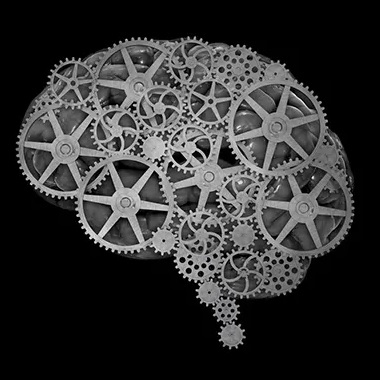I buy these things but I wonder if they are truly pharmacologically-active and not just bullshit. Discuss
The aromatic oils in plants contain the same sorts of chemicals like terpenes as in cannabis, and many are known to be pharmacologically active, including mental effects. Myrcene, for instance, is abundant in most cannabis and also found in verbena, lemon grass, hops, mango, West Indian bay tree, and cardamom.
For example here’s a paper about the psychological effects of mint oil: Volatile Terpenes and Brain Function: Investigation of the Cognitive and Mood Effects of Mentha × Piperita L. Essential Oil
Another one…
Therapeutic and Medicinal Uses of TerpenesSpearmint tea is also beneficial for acne.
How?
Ever had black coffee with cardamom? It’s very tasty, imo, and it has a strange calming effect on me, despite having a bunch of caffeine. Almost like the world just quieted, allowing me to hear everything more clearly. I’ve never known why, but maybe this is a reason.
As Tim Minchin said:
Do you know what they call alternative medicine that’s been proven to work?
Medicine.
Water has memory and whilst its memory of a long lost drop of onion juice seems infinite, it somehow forgets all the poo it’s had in it.
I mean, a natural medicine doesn’t cease to exist after a pharmacologist “discovers” its use. Willow tree bark is used to make asprin but there are still warnings out there that there is no scientific proof of its efficacy.
Maybe the medicine derived from salicylic acid is the only effective thing about it, or maybe other presently unknown compounds contribute in a way that will later be used to develop a new medicine.
Valerian root for example has been proven in animal studies and other clinical trial to have some effects, and possibly interact with GABA receptors but the mechanism is unknown and it is still described as having no science to back up its uses, despite being similar to Willow in history.
I’m not saying this to encourage people who go 100% naturopathic and might swear that all modern medicine is a poison. Just want to include some nuance in a conversation thats is often way too extreme in its convictions either way.
You are absolutely right, but I wasn’t talking about natural medicine, but alternative medicine.
Not bullshit but not magic either.
For example, L-Theanine is psychoactive, lots of clinical support for that.
Additionally, I would say that the ritual around “sitting down and having a nice relaxing cup of lemon & ginger tea” has some calming benefits in itself - even if those benefits are not from the ingredients in the tea.
Ya, maybe the bullshit part was a bit excessive as a rhetorical flourish 😳
Yes! The ritual and opportunity to reflect while drinking tea is probably more potent?
(Why am I still on my phone while drinking my 4th cup of tea? Fuck…)
For example, L-Theanine is psychoactive, lots of clinical support for that.
Which one is that in, and how much?
I drink a ton of this shit, as far as I can tell it’s just warm and tasty.
Green Tea is one of the best natural sources of L-Theanine I think.
It’s available as a refined “supplement”. I have no idea how much L-Theanine there is in Green Tea vs the refined supplement, and no idea how efficacious the supplement is.
Also no idea in which circumstances you would notice any benefits. The thing about anxiety and stress is that it’s an umbrella term that describes a bunch of different conditions each of which can be caused by a multitude of different issues. Who knows which of those issues L-Theanine might mitigate.
It’s often recommended if you’re going through withdrawals. I’ve heard it recommended for people stopping caffeine (harder than it sounds) or even SNRIs.
Like all of the supplement industry, it will depend on a couple things. One, what are the regulations in your country? How well are they enforced?
In the US, there is next to no regulation or enforcement, so often these things don’t contain what they claim to, or not the amount claimed. So you’re looking at third party testing groups or just trusting the manufacturer. Mostly the adulteration isn’t harmful, but generally inert. So if there’s very little or nothing there, it’s most likely placebo.
Next - even if you do get the dose of what it claims - I think it’s still very likely placebo, extremely weak or extremely variable effect. “alternative medicine” that has consistent effects on most people every time even when they don’t know what they’re taking isn’t usually alternative anymore - we just call it medicine.
All that said - I personally don’t see any issue with using a placebo for psychological issues - “it’s all in my head” so applying a “just in my head” fix seems reasonable as long as it’s working for me.
Whatever the heck lemongrass actually does, it sure tastes delicious
It never seems to get its own one-man show, its always lumped with at least like 5 other ingredients so I can’t isolate it but I’m sure you’re correct. I love lemon + I love grass so ya
I think the taste can be somewhat prominent in Thai curries and soups at least
It’s so good in that context! I grew some last year but uh…. never ate it. Didn’t get that large though.
I have had tea made directly from lemongrass, not the packaged kind, and I loved it
A worthwhile thing to keep in mind whether it’s for tea, supplements, or whatever, is that medication is based on things that were observed from “natural” sources.
For example, willow bark was/is/has been used for pain and inflammation. It also contains salicin which is similar to acetysalicylic acid, which you’ll know better as aspirin.
Does that mean all the things people say do a thing work? Not at all. Do some of them have varying degrees of effect of some percentage of people? Yes.
In case I’m perceived as biased or part of BigAntiCalmingTea, I’m consuming a cup right now…
Have you tried the enema method?
No comment (;) [butthole wink]
Are you a the Snow Plow Show fan or are butthole winks from something else I don’t know about?
I have no idea. I was just riffing ;)
Riffing. There’s a word used far too little, I hope I remember it later so I can use it later. ‘joking around’, ‘kidding’ ‘just joshing’… I need more riffing in my life.
See Robin Williams
My b-hole winked when I read this.
Not gonna lie, I’m kinda tempted to start a line of rage-inducing Anti-Calming teas…Maybe ephedra or some shit
deleted by creator
Lots of comments talking about product quality and research, and that’s totally true. However bear in mind that when it comes to infusions, the effects are likely to always be mild, and you also have a lot of personal taste influencing your reaction.
Take for example camomile, which has anti inflammatory properties. But how much camomile are you consuming with a single cup of camomile"tea"? Not much; also, the effects are topical ( on contact), and a drink usually doesn’t stay for too long on the same spot of your throat. A cup of camomile isn’t going to make a massive difference if you have inflammation on a tooth gum or your throat, and it won’t do anything for inflammation on your knee. And if you dislike the smell and taste, that’s not going to help at all.
deleted by creator
Super real.
Lavender has a wonderful sedating effect. I like to science, so I vaped some essential oil once upon a time… very nice calming effects that make you want to sleep, but that doesn’t knock you out. Great sleep, nice and cozy.
There’s limited hard science becasue what’s the incentive??
But thousands of years of use in practice, so that says something.
But thousands of years of use in practice, so that says something.
Could be placebo
Quacks always forget that for thousands of years we died to stupid bullshit, all the time.
Modern medicine is a big reason we have 8 billion people now, instead of a few million.
Agriculture and penicillin are largely responsible for the population boom.
I vaped some essential oil once upon a time…
Isn’t that generally ill-advised? Or are there essential oils that are safe for that?
Extremely ill advised. I’m amazed it didn’t kill him.
You don’t inhale random things to see what happens what the hell is wrong with you.
Where’s your sense of adventure?
I made an educated guess that my lungs wouldn’t melt and my brain wouldn’t shut off. It worked, was nice, might try it again.
There are essential oils I would dare do this with, but in terms of bronchial irritation and LD50, lavender oil is pretty tame.
deleted by creator
The incentive is a publication on your CV.
The problem is that people don’t know how to search for scientific articles, and aren’t versed in understanding what makes a study a good one.
Nearly all “alternative medicines” have been scientifically studied. The difference between them and regular medicines are that the real medicines have a clear clinical benefit.
I just googled it and it says this:
Amino acids and fragrance substances in tea can calm us down. In late night, a calming tea can help us sleep better. Theanine’s calming effect is the long-term result of tea-drinking. The higher theanine content can effectively suppress caffeine’s stimulation in our nerve system.
I think theanine has the best claim to this
Edit: Sometimes I wonder if its legit more aromatherapy than pharmacotherapy. Ain’t hating on it, whatever fucking works :)
Whatever keeps the wolves from the door(s of consciousness)
I remember going to a tea shop years ago. The person working there asked if I wanted one of the samples they had. The conversation went like this:
“It’s good for heart health, your liver, and getting rid of toxins.”
“Does it taste good too?”
“Oh yeah. Of course.”
“Ok. Let’s start there.”
Tea can do many things but it’s not medicine. That’s stupid.
Placebo effect is real.
Not only is it real, but you can still benefit from placebos knowing that they’re placebos! VSauce did a pretty cool episode on it: https://youtube.com/watch?v=QDCcuCHOIyY
Here is an alternative Piped link(s):
https://youtube.com/watch?v=QDCcuCHOIyY
Piped is a privacy-respecting open-source alternative frontend to YouTube.
I’m open-source, check me out at GitHub.
That’s why double-blinded studies exist.
Maybe it is, but that shit really helps me
A lot of them are just subjectively calming your mind, I think, by being warm, soothing and pleasant. The main exception for me is chamomile, which I have seen some minor results with. Which is slightly annoying because I don’t particularly like the flavor. At all.
It doesn’t help me stay asleep though, just fall asleep. Can work sometimes when I’ve had a little too much caffeine.
Melatonin helps me stay and fall asleep, which is bad for me somewhat considering I can easily accidentally sleep 12 hours if my alarm goes off during a deep sleep cycle. But if I had something to help me fall asleep and maybe calm me for a few hours, that’d be ideal.
Maybe I’ll try some chamomile.
It depends completely on the plant, the processing (if any), and other factors. I know nothing about lemongrass but St Johns Wort for example is GABAergic, acts on serotonin and dopamine, and under controlled trials shows clinical significance.
Placebo is one of those factors and it can be a MASSIVE factor. Conversely, nocebo, the opposite of placebo shows that if patients do not believe something will work, even though it’s shown highly significant clinical success, chances of it working on them are far less.











